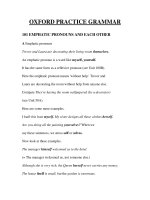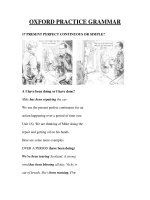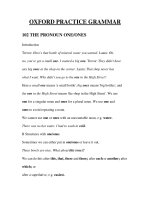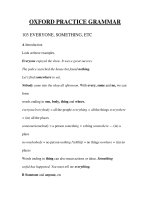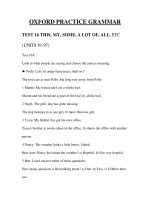OXFORD PRACTICE GRAMMAR 108
Bạn đang xem bản rút gọn của tài liệu. Xem và tải ngay bản đầy đủ của tài liệu tại đây (87.87 KB, 6 trang )
OXFORD PRACTICE GRAMMAR
108 ADJECTIVE OR ADVERB? (1)
A Introduction
Vicky: / like that song that Natasha sang.
Rachel: Yes, it's a nice song. And she sang it nicely, too.
An adjective (nice) describes a noun (song). An adverb (nicely) describes a
verb (sang).
The man had a quiet voice. The man spoke quietly.
Claire wears expensive clothes. Claire dresses expensively.
The runners made a slow start. They started the race slowly.
We do NOT say She sang it nice.
We can use adverbs in other ways. An adverb like really or very can be
combined with an adjective (hot) o
another adverb (carefully) (see Unit 115).
It was really hot in the sun. Andrew checked his work very carefully. An
adverb like fortunately or perhaps says something about the whole
situation.
Fortunately nothing was stolen. Perhaps Sarah is working late.
B The ly ending
We form many adverbs from an adjective + ly. For example politely,
quickly, safely.
But there are some special spelling rules.
1 We do not leave out e, e.g. nice —> nicely
Exceptions are true —> truly, whole —> wholly.
2 y—> ily after a consonant, e.g. easy —> easily, lucky —> luckily
Also angrily, happily, heavily, etc.
3 le —> ly, e.g. possible —> possibly
Also comfortably, probably, reasonably, sensibly, terribly, etc.
4 ic —. ically, e.g. dramatic —> dramatically
Also automatically, scientifically, etc. (Exception: publicly)
C Looked nice and looked carefully
Compare these two structures.
LINKING VERB + ADJECTIVE ACTION VERB + ADVERB
Tom was hungry. Paul ate hungrily.
The children seemed happy. The children played happily.
My soup has got cold. The man stared coldly at us.
An adjective can come after a linking verb such as We use an adverb when
the verb means that
be (see Unit 104B). something happens.
Some verbs like look, taste and appear can be either linking verbs or action
verbs.
LINKING VERB + ADJECTIVE ACTION VERB + ADVERB
Mike looked angry. He looked carefully at the signature.
The medicine tasted awful. Emma tasted the drink nervously.
The man appeared (to he) drunk. A waiter appeared suddenly.
page 380 American English
108 EXERCISES
1 Adverbs (A-B)
This is part of a story about a spy called X. Put in adverbs formed from these
adjectives:
bright, careful, fluent, immediate, patient, punctual, quiet, safe, secret, slow
The journey took a long time because the train travelled so (►) slowly. It
was hot, and the sun shone
(1) ………………………… from a clear sky. X could only wait
(2)……………………….. for the journey to
end. When the train finally arrived, he had no time to spare, so he
(3)…………………………. took a taxi
to the hotel. Y was on time. She arrived (4)……………………….. at three.
No one else knew about the
meeting - it was important to meet (5) ..........………………. . 'I had a
terrible journey,' said Y.
'But luckily the pilot managed to land (6) ..................………….. .' Her
English was good,
and she spoke very (7) …………………. .........X was listening
(8)……………………….. to every word.
They were speaking very (9) ................................. in case the room was
bugged.
2 The ly ending (B)
Look at the information in brackets and put in the adverbs. Be careful with
the spelling.
► (Emma's toothache was terrible.) Emma's tooth ached terribly.
1 (Henry was angry.) Henry
shouted........................................................................ at the waiter.
2 (I'm happy sitting here.) I can sit here
................................................................for hours.
3 (The switch is automatic.) The machine switches itself off
....................…………………….
4 (The debate should be public.) We need to debate the
matter............………………………..
5 (Everyone was enthusiastic.) Everyone discussed the idea
………………………………………
6 (We should be reasonable.) Can't we discuss the
problem............……………………………... ?
7 (The building has to be secure.) Did you lock all the doors
..............…………………………….. ?
3 Adverb or adjective? (A-B)
Decide what you need to say. End your sentence with an adverb ending in ly.
► Tell the police that you can't remember the accident. It isn't very clear in
your mind.
I can’t remember the accident very clearly.
1 Tell your friend that United won the game. It was an easy win.
2 Tell your boss that you've checked the figures. You've been careful.
3 Tell your neighbour that his dog barked at you. It was very fierce.
4 You are phoning your friend. Tell him about the rain where you are. It's
quite heavy.
4 Adverb or adjective? (A-C)
Vicky is telling Rachel about a dream she had. Choose the correct forms.
l had a (►)strange/strangely dream last night. I was in a garden. It was
getting (1) dark/darkly, and it was

